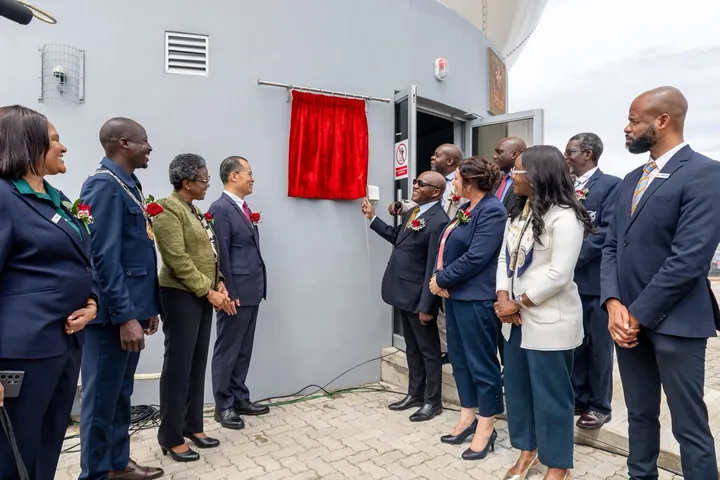By Ishaq Khalid
The point-of-sale device now provides financial solutions to millions of people in rural areas of the African country, where formal banking services are yet to be introduced.
In Kafin-Tafawa – one of many nondescript villages that dot northern Nigeria's Bauchi state – a small, yellow-painted shop, bustles with economic activity.
As people queue up for different transactions, Hassan Abdullahi plays the banker – armed with nothing more than a debit card swiping machine, the point of sale (POS) in banking terms.
Abdullahi helps people make money transfers, withdraw cash or pay bills using a small device.
For customers withdrawing money, he gives cash after using their debit cards to transfer the equivalent amount into his account. In contrast, for those who want to deposit money or pay bills, he collects cash and transfers the equal amount to the bank account the customers want to be credited. He charges a commission for each transaction.
Known as 'POS operators', thousands of people like Abdullahi are ushering in a revolution in Nigeria, where institutional banking penetration is abysmally low.
The scheme launched by Nigeria's central bank has not only helped take banking services to remote areas but also provided employment avenues to many in the country of more than 200 million people. However, the POS operators are not bank employees but outsourced agents transforming Africa's largest economy.
Booming business
Abdullahi's village doesn't have a single bank, not even an ATM, for people to do financial transactions – just like thousands of other rural areas across Nigeria.
So, when he opened the shop in 2021, it opened a new window for the village residents.
The 30-year-old school dropout tells TRT Afrika that he started his business with a small loan from his sister. Now he earns between 50,000 Naira ($112) and 60,000 Naira ($135) monthly, about double the minimum wage in Nigeria.
"This money helps me to take care of my family" and sometimes "even help others," he says.
Abdullahi says he is happy with his success and hopes to enrol in a university for his degree – which he could not do after completing secondary school a few years ago because of financial constraints.
"I believe I am also helping my community because, without the POS, people (used to) get stranded and frustrated," he adds.
Abdullahi is just one among an estimated 1.4 million mostly young people directly employed in the POS business in a country where poverty and unemployment rates are alarmingly high.
These POS transactions are mainly done by small businesses, low-income earners, and the unbanked population in rural and urban areas. But the volume and value of such transactions are massive and increasing.
Data from the Central Bank of Nigeria (CBN) indicate that financial transactions worth 6.4 trillion Naira were done through POS terminals in Nigeria in 2021, representing an unprecedented 36 percent increase from the previous year. The number of financial transactions was about 47 percent of Nigeria's total budget for 2021.
Digital push
In 2012, the central bank developed a "cashless policy" to limit the amount of cash in circulation and encourage digital banking. This has greatly helped in boosting the POS business.
The apex bank has also acknowledged the vital role of POS terminals in rapidly bringing more Nigerians into the banking system, particularly those in rural areas.
According to Isa Abdullahi, a senior lecturer at the Department of Economics and Development of the Federal University in the town of Kashere, the introduction of the POS business was "one of the best things that have happened to the economy" in recent years.
He says it was primarily because of "its ability to employ people", especially school dropouts and making financial transactions "much easier". Moreover, he says it's becoming increasingly popular and acceptable because the money agents are "at your doorstep".
This is a view shared by Victor Ojolo, President of the Association of Mobile Money and Bank Agents, who represent POS money vendors in Nigeria.
He tells TRT Afrika that their economic contribution is "phenomenal". He says the POS business has created many jobs for the money agents and other subsidiary businesses, such as those producing paper for transaction receipts as part of a "great value chain". This is key in addressing unemployment in Nigeria, which stood at 33 percent in 2021.
"The POS business has revolutionised banking in Nigeria," he says, adding that they are available even in areas where "banks do not imagine".
Challenges remain
Despite the rapid boost and growing popularity of the POS business, it still faces multiple challenges affecting private bank agents and their customers.
The recent policy by the Nigerian government introducing new currency notes and drastically limiting cash withdrawals from banks and machines has hugely impacted the POS business hitting the operators and customers.
The agents needed help accessing cash to dispense, and where they managed to get it, they charged their customers much higher commissions. As a result, some had their businesses grounded. Although the policy has been relaxed and things are improving, the situation has yet to return to normal.
Another challenge over the years has been the high number of customer complaints about delays or money not being credited to target accounts after being debited from the sender.
Experts attribute this mainly to the failure of bank servers, interbank communication breakdown or internet connectivity issues at the POS terminal.
Customers and POS terminal operators have often complained that it takes too long – sometimes several weeks – to reconcile a failed transaction or to reverse it, putting the victims under financial strains, especially the low-income earners.
Victor Olojo says another challenge is that different government agencies in some states collect "multiple taxes" from them – a situation that is taking a toll on their "small businesses".
He appealed for a more transparent institutional framework for their operations and tax collection procedure. He says his union and the authorities have been working to address some of the issues.
With Nigeria's financial sector undergoing massive reforms and the central bank intensifying efforts to ensure the economy goes "cashless", Ojolo believes that POS and other mobile financial services are "actually the future of banking" in the country.
'POS is a saviour.'
Back at Abdullahi's POS shop in Kafin Tafawa, it's business as usual as Hassan Hamidu withdraws cash – within minutes – to buy foodstuff for his family of 15. "I am a regular customer at POS terminals," he says, describing the POS as a "saviour".
The 50-year-old civil servant recalled a late evening when POS services helped him to get cash to rush his sick child to a hospital.
"It was an emergency, but I had no cash," he says. However, he could run to the POS shop across the street from his home, withdraw money within minutes and rush his son to a medical centre.
He said if he were to go to a bank or an ATM in the city to get cash, it could take him at least one-and-a-half hours which could "make the situation worse for my child".
Hamidu is not alone. Millions of Nigerians and small businesses in rural areas, as well as major cities like the capital Abuja and the commercial cities of Lagos and Kano, are now wholly dependent on POS shops for their financial needs because of their timeliness, accessibility and convenience.









.JPG?width=512&format=webp&quality=80)












